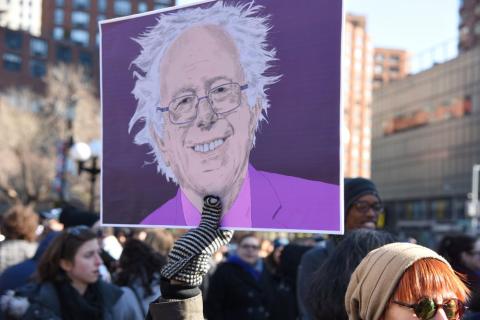https://www.youtube.com/watch?v=8YuReziwss0
Sen. Bernie Sanders is currently fighting to transition the US to a single-payer health care system – a system whereby the government provides one plan for insurance coverage to every single American. While it may struggle to gain traction at the national level, California may offer Sanders an ideal starting point.
Both Sanders and California Lt. Governor Gavin Newsom have separately discussed the idea of guaranteed health care for all, and the benefits it would bring California residents.
Newsom believes "single-payer is the way" for his state, saying in a recent gubernatorial debate that the "single-payer system drives down the cost of health care, drives down the cost of prescription drugs...and provides more effective, efficient, and universal access for all of those who are uninsured."
When Newsom was mayor of San Francisco, he worked hard to create city-wide public health care and urged the Democratic National Committee to include Medicare-for-All in its platform.
Newsom has also explained that the failed Graham-Cassidy bill -- another attempt to replace Obamacare -- would have potentially impacted 6.7 million Californians by 2027 and could have resulted in up to $78 billion in lost federal health care funds to the state over the next decade.
Additionally, Newsom has stressed that the current health care spending in California is unsustainable, and that the health care budget is devouring California’s finances.
This is why California is a prime battleground for the single-payer push. The state desperately needs a positive alternative vision.
Some Democratic leaders are cynical about the major political and policy fights that lie ahead. For example, US House Minority Leader Nancy Pelosi has maintained that her focus is protecting Obama’s Affordable Care Act from the opposition’s desire to dismantle it.
However, Newsom has heavily criticized the Democratic Party for failing to consider or support Sanders' efforts:
"Democrats are upset. Because we have someone who actually has an alternative? Maybe that's fundamentally the problem with the Democratic Party. People are critical of the fact that [Sanders] should just be playing defense. That's hardly an aspiration -- defense. We need an offensive strategy." - California Lt. Governor Gavin Newsom
At a rally organized by the California Nurses Association, Bernie Sanders said, “Every poll I have seen indicates that more and more Americans support a Medicare-for-all, single-payer program,” and went on to label the opposition as greedy insurance and drug companies who make billions off the current system.
Sanders' plan, the Medicare for All Act, details exactly what level and type of insurance each American would receive. The idea is to ensure that no one is out of pocket following a visit to a doctor and to bring the uninsured rate from almost nine percent to zero.
This would, of course, need to happen gradually – Medicare, the federal health insurance program for Americans who are over the age of 65, or suffering from diseases or disabilities, will expand until everyone is covered.
While the Veterans Affairs health system and the Indian Health Services would continue, Medicare and Medicaid would no longer function as separate initiatives. Moreover, what is refreshing is that no employers would be allowed to offer separate plans to compete with this new, government-run system.
Reassuring the public, Bernie says:
“You’re going to the same private doctor that you went to. You’re going to go to the same hospital that you went to. The only difference is instead of having a Blue Cross Blue Shield card – and having to argue with your insurance company – you’re going to have a Medicare for All card. That’s it.”
Yet both Sanders and Gavin Newsom are aware that this will not be an easy ride.
As Bernie has repeatedly warned the American public, Republicans and members of the DC establishment will argue that his plan will increase everyone’s taxes – and while this is true, it will likely differ per pay scale, and will also remove rising insurance rates, which can be up to $20,000.
Costs are also an issue in California, where Democratic State Assembly Speaker Anthony Rendon shelved a single-payer bill that passed the Senate over the summer, calling it a "woefully incomplete" plan.
The bill is estimated to have an annual price tag that ranges from $330 billion to $450 billion, and is once again up for debate in the legislature.
Opponents argue that single-payer would cripple the state financially. Former Democratic Los Angeles mayor and gubernatorial candidate Antonio Villaraigosa -- who likes the concept of single-payer -- said, "You can’t just say I want pie in the sky, because that doesn’t put food on people’s tables."
However, Newsom counters this argument by pointing out a UCLA study that found Californians already pay $367.5 billion on health care, whether through private insurance or public programs.
The fight for universal health care will be a long struggle. However, Sanders and others like him will inevitably continue to push for these health care reforms, especially given their strong belief that “there is growing support among the American people.”
Photo Credit: a katz / shutterstock.com
